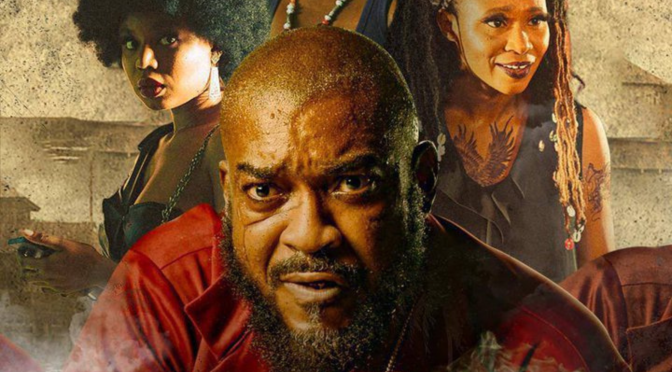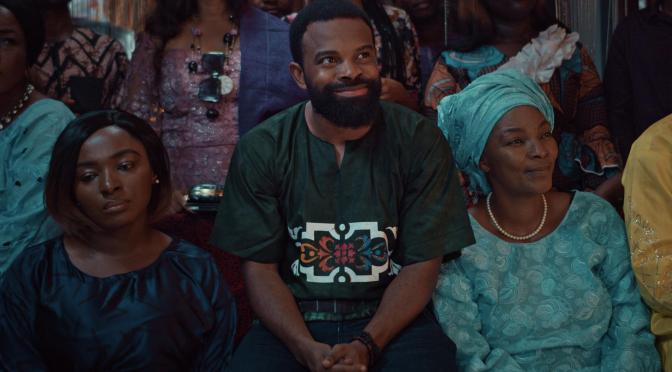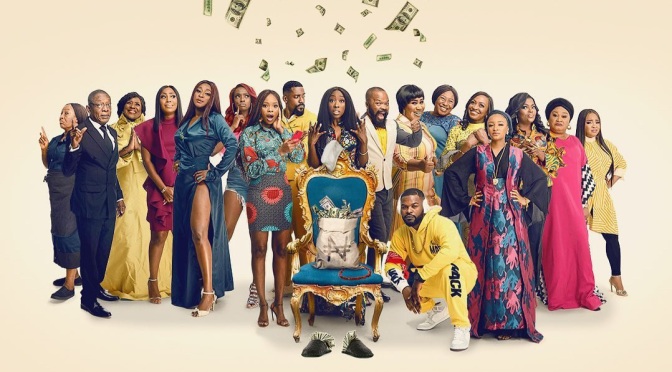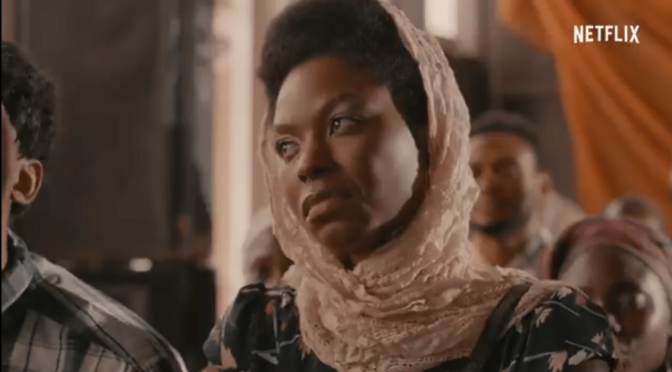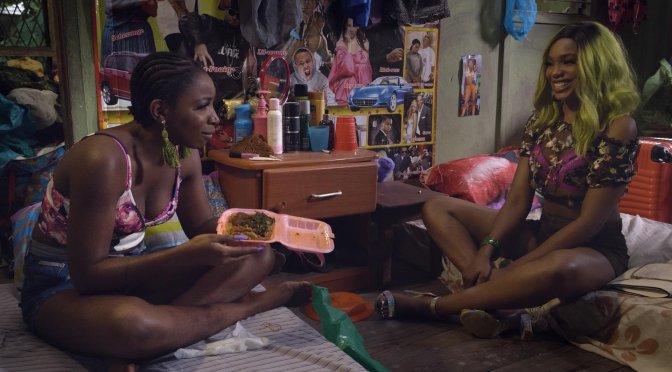Nollywood has always reached for the stars, and now, more than ever before, it truly has the chance to get there as all the tools to make it possible are finally at its disposal. Since the turn of the 2010s, we’ve watched the industry release movies and TV shows that have pushed the boundaries of what we once thought obtainable from a made-in-Nigeria production. It hasn’t exactly been a smooth journey; like most things in life, but Nollywood post-2010, has experienced its fair share of ups and downs with some productions being much better than others. Yet, no one can deny the level of growth the industry has experienced all leading up to the debut of Shanty Town, which is officially the first Nollywood production to be released in 2023.
Like most of its predecessors since the arrival of international streaming services into the Nigerian movie industry, the road to Shanty Town’s debut on Netflix was met with fanfare and hype. Talks from its creators and stars about it being the next big thing we didn’t see coming littered every blog and magazine that cared to carry the news. Personally, I’ve learned to not be fazed by this kind of statement as they’re exactly what they set out to be – marketing promos to drive interest in the movie, which is simply a part of the filmmaking process.

The official synopsis for Shanty Town reads:
A group of courtesans (another word for prostitutes) who want to break free from the control of an infamous kingpin soon realize that doing so will be more difficult than they imagined because of political corruption and blood ties.
The Good
Straight to the point, shall we?
Did I like Shanty Town? Yes, I did like parts of it. I really enjoyed watching Chidi Mokeme find his way into my heart again. I was lost in his mesmerizing portrayal of Scar, a “generic” Lagos tout, and it reminded me of some of the things I really love about him and his generation of actors (Chidi is 50 years old, by the way). As is a by-product of such a captivating performance, just like we saw when Sola Sobowale debuted the character of Alhaja Eniola Salami in 2018’s King Of Boys, Mokeme’s Scar has, once again, resurrected the unending argument over who reigns supreme between Old Nollywood vs. New Nollywood. While I think the answer here isn’t simple and is best left to individual choice, there’s no denying Chidi Mokeme is the highest-ranking performer in Shanty Town, arguably the best part of it. This isn’t to take away from the commendable performances most of the other cast members put into their roles as the acting performances were one of the strongest things Shanty Town had going for it – but there’s just no denying Chidi Mokeme as Scar stole the show.

Other things I like about Shanty Town are its amazing visuals, cinematography, smart capturing angles, particularly in the opening scene at Shangisha, sound quality, and overall production feel. With how much better and somewhat consistent big-budget Nollywood productions have been getting with the technical side of things, it’s getting incredibly easier to gloss over them, forgetting so soon how not-so-good-looking movies used to be not too long ago. That’s real growth. Then there’s the use of the Ibibio language between Ini Edo and Nse Ikpe Etim’s characters (Amanda/Inem and Enewan). My gosh! I never knew the language was this beautiful, and I’m glad it’s getting the attention it looks long deserved for. In fact, I hope to see major Nollywood productions highlight more indigenous Nigerian languages, especially away from the three main ones everyone seems to be conversant with to some degree.
The Bad
Now to the things I didn’t really like about the show. They’re a lot, so, to simplify things, I’ve decided to list them out in bullet points rather than in thick blocks of prose. That should make them easier to follow.
- Shanty Town should’ve been a movie

I don’t know this for certain, but my professional guess is that Shanty Town was a movie turned miniseries at the last minute. We see evidence of what it once was in the pacing of its episodes’ and the way the writing struggles to come together in most scenes. A lot of what should’ve been left on the cutting floor made it into the final cut and what we get is a 6-episode series that feels painstakingly long and laborious to watch. Episode 3 is the worst culprit of this (alleged) creative decision. The introduction of Shaffy Bello’s character, Mama, could’ve done with a more compact, straight-to-the-point take than the drowsy exposition we got between the character and Scar, which takes about half the entire episode’s runtime.
- Suspension of belief taken too far
Going down this list, you’d see that most of the issues I had with Shanty Town can be traced to creative decisions and licenses taken by its writing team led by Xavier Ighorodje. In trying to do something nice, Shanty Town does too much with the too little it has going for it, and what it requires to get through is a very deep suspension of belief at almost every turn. When you think you’ve seen the worst of it, you’re once again called upon to suspend your belief of what is obtainable in this reality a little more – cue in the scene where Shalewa plays Jackie’s voice note that was inexplicably sent to her.
- A lot of scenes fail to ask the WHY question
One important rule in screenwriting is that every scene included in the final project must serve a purpose. If a scene must remain in a movie or TV series, it must be building up to something or answering a question already posed by a previous scene – the WHY question. Why does this scene exist and what does it add to the overall story? Why does Inem pick up the phone to inquire about sensitive information on life and death from Enewan when she could either wait for her to return or go after her? What is the consequence of making such a silly move? The WHY question is important and the failure to ask and thoughtfully answer it on the drawing table during the early process of storyboarding is why some scenes and character motivation just don’t add up when watching the released version.
- Poetic idiosyncrasy: Of the character or the writers?
As a writer myself, I understand the appeal of poetry. It makes things beautiful and more colourful, especially when infused into a grand-looking production like this one. You have expert orators like Shaffy Bello and RMD and you simply want to maximize what you already know is a talent they possess. But that can also be a trap, like in this case.

I couldn’t help but notice the indiscriminate use of poetic-sounding lines by multiple characters in the series to the point that it becomes glaring that this isn’t a trait unique to any particular character but, perhaps, the writers projecting themselves and their interests upon the characters they’ve been tasked to create. While this isn’t a bad thing in its entirety, it sort of alludes to a roughened version of the law of demand and supply – if everyone has it, it isn’t special any longer. If all the characters are lords of speaking in a poetic manner, almost no one is memorable for it.
- Lack of relevant backstory and significant build-up to moments of great payoff
Even with its 6-episode count, Shanty Town does an underwhelming job successfully juggling between its decent number of characters and giving some of them backstories to make them feel richer in the mind of the audience. I opine knowing why Femi Fernandez (Peter Okoye) is considerably much less ambitious than his father, or how Scar got his name and the scar on his face, or what Mama’s real beef with Chief Fernandez (RMD) really is would all have made the series appear stronger.
The Ugly
The writing really sucked as the show progressed, almost quickly unveiling its struggle with an obvious case of an identity crisis.
Like Peter Okoye’s struggle with fully embodying his character (Femi Fernandez), Shanty Town, too, struggled with knowing the main story it was trying to tell.
Are we watching a political thriller mostly between Dame and Chief Fernandez’s claim to the seat of power in Lagos? Or is it a story of vengeance as portrayed by Ini Edo’s Amanda (or is it Inem)? Or is this an exposé on the harsh realities of living in a slum? Or (surprise!) is this a supernatural thriller, because I still can’t wrap my head around that deus ex machina RMD pulled off during the shootout in e06?

I understand it could, technically, be all of this, but while Shanty Town dangles all these exciting moving parts before its audience, it clearly struggles with the way it makes them all come together. What it does is have most of these listed arcs and more fight for dominance, some without any real setup, making it really difficult to know the main message the show is trying to pass across. By the time the show ended, I was, more or less, exhausted, from having to keep up with the many shenanigans of the inhabitants of Shanty Town.
Luckily for it, as my people would say, na small thing e take escape complete disaster.
Some funny moments

- Ini Edo’s Inem channeling her inner Black Widow to defeat that henchwoman during the final battle in e06.
- Chief Fernandez’s political rally speech in e06. 😂
- Chief Fernandez’s character was a Tinubu spoof. Down to the cap. I laughed out loud when it finally clicked. 😂
Somewhat pointless

- Mama (Shaffy Bello’s character) reveals she wanted to fuck one or more of Fela’s Kalakuta queens during her character exposition in e03. Issokay!
- Ini Edo’s character revealing that she is a twin is poorly handled, full of cliches, and lacked the emotional payoff the filmmakers were going for.
- Mummy T’s character. Sorry, Sola Sobowale, but that character did nothing for me. Take her out of the series completely, and I think we’d still be good.
- That final scene with Toyin Abraham at the ritual site. Was that a cliffhanger? I’m not exactly sure what to make of it.
Consensus
Shanty Town had no business being a miniseries. That’s its greatest crime. A 2hr movie with the same set of shot materials would’ve given us something more cohesive and truly memorable. An important lesson Nigerian filmmakers tend to forget these days is that the destination is only as important as the journey that took us there. Filmgoers, like myself, go in for the experience of the journey; throw in a satisfying ending and that’s an even bigger win.

